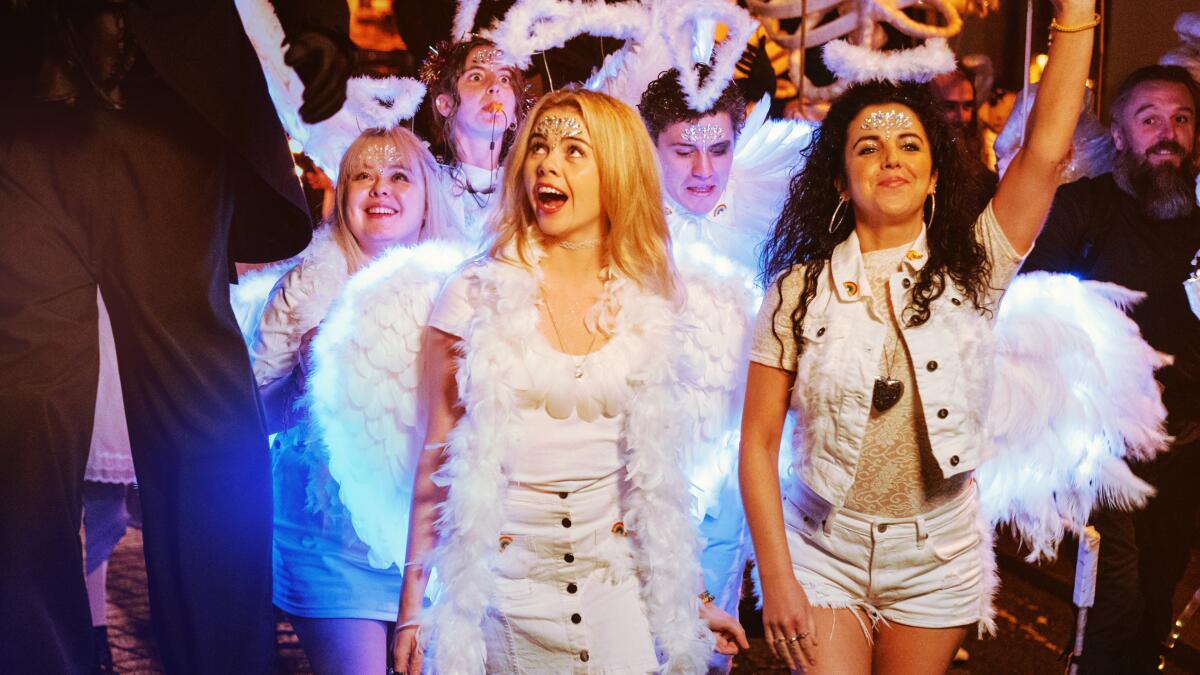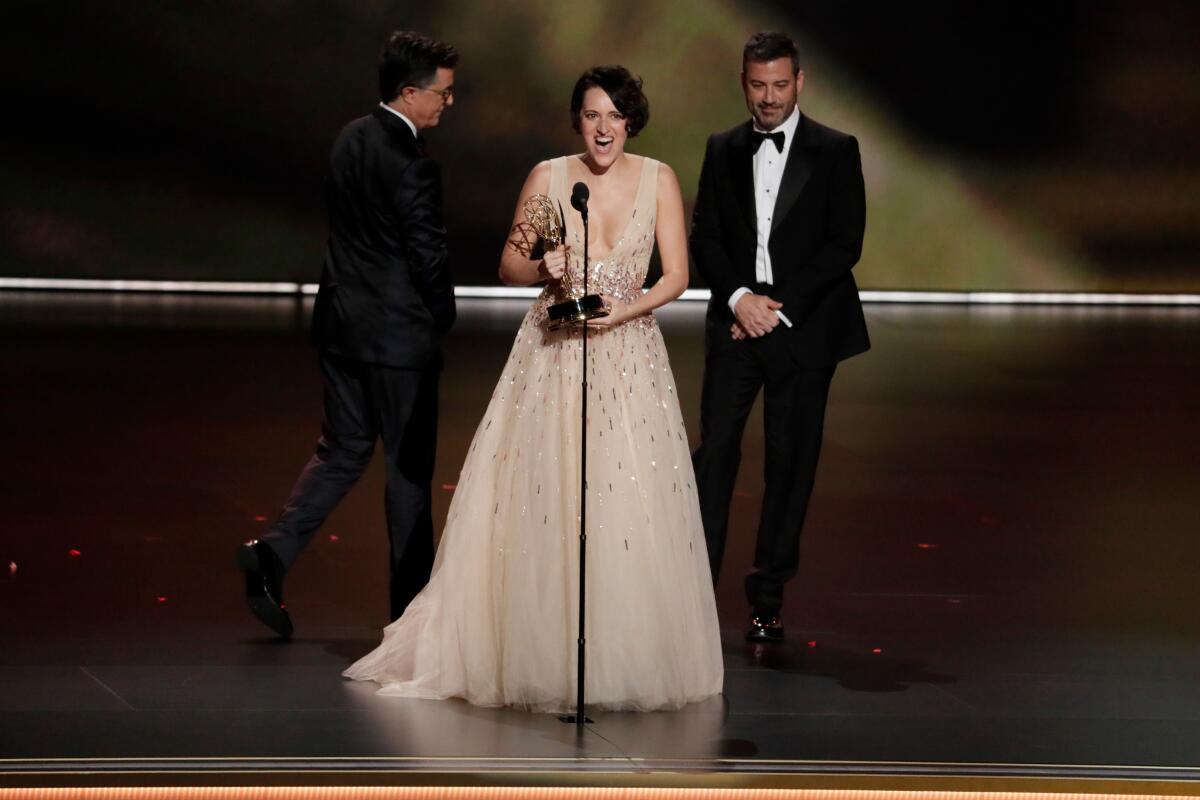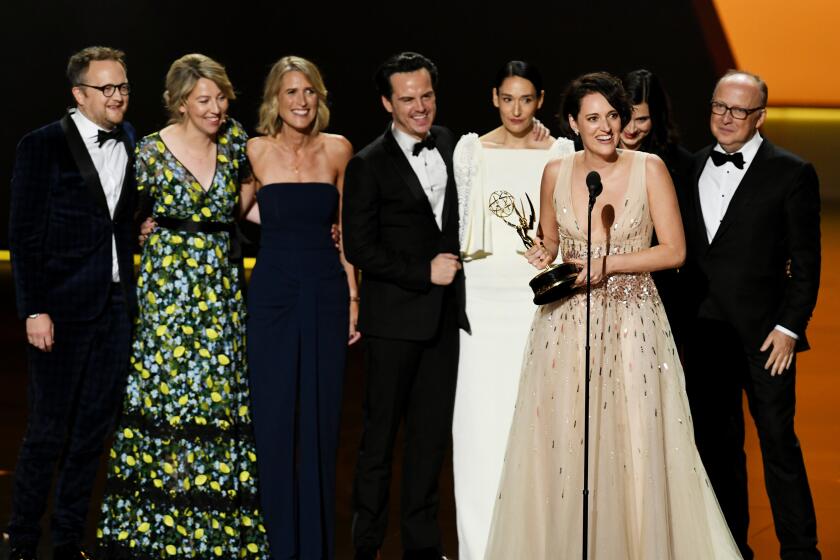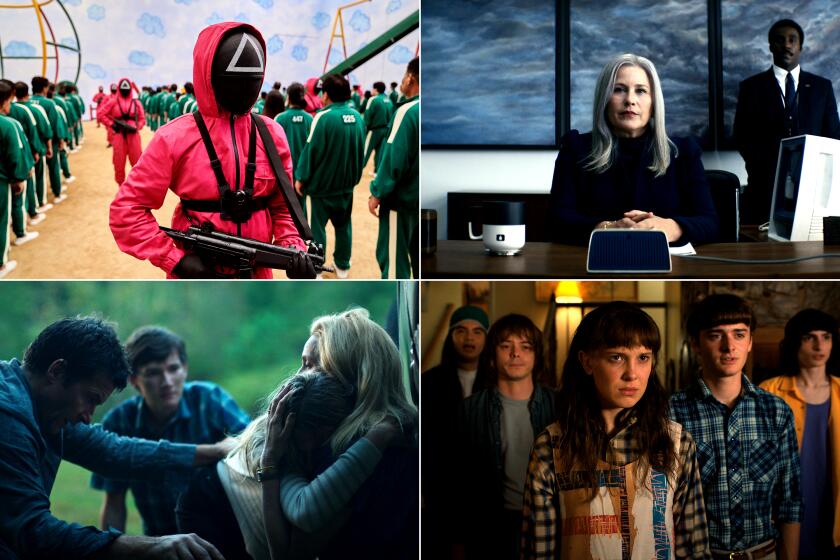Column: ‘Derry Girls’ is the brightest wee gem of TV’s new jewel-box comedy trend

- Share via
There’s a scene in the second season of “Derry Girls” in which the cool new teacher at Our Lady Immaculate College oversees a bit of hurling practice, encouraging her students to hit the ball while thinking of something they really hate. “Injustice,” shouts Erin (Saoirse-Monica Jackson); “Prejudice,” yells Claire (Nicola Coughlan). “That the people here use the word ‘wee’ to describe things that aren’t actually that small,” squawks James (Dylan Llewellyn), the school’s only boy and a British transplant.
It is important to keep James’ observation in mind when thinking of “Derry Girls,” which recently dropped its third and (sob) final season on Netflix. It went out with a bang, so it did, with a constellation of guest stars, including Liam Neeson playing an increasingly flustered copper, Chelsea Clinton playing herself and a finale that will enter the pantheon of best closing episodes ever.
With a sum total of 19 episodes, most of which run less than a half hour, “Derry Girls” could accurately be described as a lovely wee series. But it’s small only like the Kohinoor diamond is small: It may fit in the palm of your hand, but it’s still priceless.
That the Kohinoor is also a symbol of British oppression also applies; like that diamond, “Derry Girls” reflects years of tragic, bloody conflict and still manages to be a thing of pure and shining beauty, demanding to be held to the light and viewed over and over, from one angle and then another.
It is the latest, and perhaps best, example of what could be called “jewel-box television,” short and often-but-not-always sweet series that focus more on exquisitely rendering an actual story arc than creating a long-running joke machine.
Easily consumed in a sitting, they sparkle in a landscape littered with far too many long (if sometimes worthy) slogs, luring the viewer into a front-to-back rewatch, the better to admire this hilarious moment, that pitch perfect delivery.
A far-flung family, each member accustomed to doing exactly what he or she wants, finds itself suddenly brought together in reduced circumstances. How “Schitt’s Creek” unwittingly became a map of life at home amid the pandemic.
In comedy, the jewel boxes are very much on display. With two seasons of six episodes under 30 minutes, “Fleabag” swept the 2019 Emmys and set the new “wee” template. “Schitt’s Creek” and “Ted Lasso,” which followed in “Fleabag’s” sweep marks, had longer seasons but 14 is palm-sized compared with the 23-episode average of broadcast comedies.
In dramas, episodes that are a half an hour or less are rare — Stephen Frears’ ”State of the Union” is a delightful exception — but “Sherlock” proved that even when adapting an enormously prolific detective, less can be more.
“Derry Girls,” however, is unique, a tonal hybrid that takes on themes more traditionally associated with drama — terrorism, violence, institutionalized prejudice — in its own hilarious way and follows a finite emotional narrative.

For those poor (or, in the show, “puir”) souls who have not yet seen “Derry Girls,” it is a coming-of-age comedy set in the Northern Ireland town of Derry (or Londonderry to the Protestant/loyalists) in the 1990s. The site of Bloody Sunday and other early flashpoints of the Troubles, Derry in the ‘90s was a divided town of walls, checkpoints and the ever-present threat of violence.
It was also filled with ordinary people living ordinary lives in extraordinary circumstances, including “Derry Girls” creator Lisa McGee, who has drawn on her memories to tell the story of five teenage friends and their families.
Erin Quinn, who wants to be a writer, serves as the show’s focus, but she and the four other main characters — cousin Orla (Louisa Harland), best friends Claire and Michelle (Jamie-Lee O’Donnell) and Michelle’s British cousin James — pretty much move as one. While they are aware of “the bombing thing,” they are typical self-centered teens, worrying about school and romance, longing for freedom but expecting dinner and clean laundry. They get into all manner of PG mischief, only to be inevitably hauled into the office of school principal Sister Michael (Siobhan McSweeney).
Some of the humor, and the drama, is drawn from the political tension of the times, with James rather than, say, members of the Ulster Defense Assn., embodying the cultural divide.
“The Troubles” seems incommensurate — euphemistic even — as a descriptor of the social fission that cleaved apart Northern Ireland in the late 20th century.
When he comes to live with Michelle’s family, they send him to the all-girls Our Lady Immaculate out of fear he will be killed at the boys’ academy. In the first season especially, he serves as a shocked observer of Derry’s singular definition of “normal,” which includes school buses being pulled over for bomb sweeps, a “Provo” (member of the Provisional Irish Republican Army) hiding in the Quinn family’s car trunk as they flee Northern Ireland to avoid the inevitable riots of parade season and a very bumpy “friends across the barricades” retreat that forces Catholic and Protestant students together.
Eventually, James becomes an honorary “Derry girl,” an actual friend across the barricade. There are, however, plenty of dark-humored digs at the British, especially in the final season. “Why can’t everyone just speak English?” James moans at one point when the group tries to get directions from an Irish speaker who no one understands. “Well,” Erin spits, “your crew had a good stab at forcing the entire world to, but we didn’t much enjoy it James, imperialistic prick.”
Each season has a welter of ‘90s cultural references (Hugh Grant’s arrest, Chernobyl, the Spice Girls, Fatboy Slim) as well as slightly fudged timeline of historical facts — the Omagh bombing, President Clinton’s visit, the 1994 ceasefire and, finally, the Good Friday Agreement. But just as many storylines follow more universal themes: showdowns with irritating schoolmates, arguments with parents, ill-reasoned plans to make money or get to a forbidden concert or meet some boys. (Or in Claire’s case, a girl; in the first season, she comes out as “a wee lesbian.”)
If Lucy and Ethel had been five teenagers living in 1990s Northern Ireland, they would have been ”Derry girls.”
That McGee manages to cover so much ground in episodes of 25 minutes is a miracle in itself, though it certainly helps that her dialogue moves with the speed and power of an automatic weapon (for those unfamiliar with the Derry accent, subtitles help).
The “girls” are a perfectly cast assortment of personality types surrounded by family just as beautifully drawn and astutely performed, including Erin’s Ma, Mary, (Tara Lynne O’Neill), her Da, Gerry (Timmy Tiernan), Aunt Sarah (Kathy Kiera Clarke), Granda Joe (Ian McElhinney) and Uncle Colm (Kevin McAleer).
Watching the entire series for the second time (and the first two seasons for at least the fourth), I marveled at the comedic mileage O’Neill can get out of a need for “darks” to fill out her laundry load (“A half load goes against everything I stand for, you know that Da”) or Tiernan’s outstanding performance as Gerry who, as the inevitable straight man, reveals whole universes of emotion in terms like “alright then” and “grand so.”
Emmy voters favored Phoebe Waller-Bridge’s comedy over the final season of HBO’s “Veep” and defending champion “The Marvelous Mrs. Maisel.”
And then, of course, there’s Sister Michael. The most deadpan cynic to ever don a wimple, most of her prayers come in the form of exhortations to “sweet suffering Jesus.” “Lovely job so far, Seamus,” she says, as a local priest introduces the community to a group of Chernobyl refugees, “but keep it moving. ‘Rawhide’ is on in 15 minutes.”
Any decent comedy or drama has beloved characters, fine acting and quotable moments, but “Derry Girls” and other jewel-box shows have very little else. Everything but human interaction and emotion has been cut and polished away. Even with the backdrop of the Troubles, McGee is interested only in her characters; she just throws down a plot point and lets them do what they would do naturally.
What they would do naturally is grow up. In the COVID-19-delayed third season, the “girls” are all young women now (except James who is a young man) and though they still get into silly scrapes, McGee highlights their new maturity by pushing them into political awareness.
Season 3 gets seven rather than six episodes and the last, which is 45 minutes long, sees all the characters coming to grips with the Good Friday Agreement, on which they must vote. Plenty of jokes are made about how complicated it is, but the conflict of whether to vote for a treaty that includes the release of political prisoners, many of whom have killed people, is taken quite seriously.
As it should be. As Granda Joe tells Erin, it is up to the young people to decide what happens next, and so we leave “Derry Girls” with a powerful message about the importance of facing the issues and showing up to vote. It is as moving an episode of television as you will ever see, joyful and somber, hilarious and significant. No doubt there would be an audience for another season or eight of “Derry Girls,” but McGee’s story is at an end.
A lovely wee comedy about all the world and Derry in the ‘90s. See how it shines.
The collective message of Emmy-favorite dramas reflects a more general feeling of being trapped and manipulated by forces greater than ourselves.
More to Read
The biggest entertainment stories
Get our big stories about Hollywood, film, television, music, arts, culture and more right in your inbox as soon as they publish.
You may occasionally receive promotional content from the Los Angeles Times.













